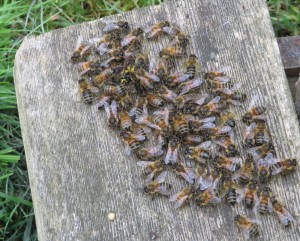Blog – bees, beekeeping & other sticky subjects
A bell jar observation hive
The nectar flow is still strong in southern England at the moment, so there may be a chance for this little nucleus colony to fill the bell jar. Usually the summer flow has finished by this date, but everything has been so late this year, it is still going.
The bell jar sits on top of the small nucleus and was primed with a few slim strips of foundation stuck to the wall of the bell jar — one strip with a wiggle to see what the bees would make of it.
Already they have started to build on the starter strips. Let’s see what happens in the next few days!
Vita’s Guest Beekeeper Blogger
Wasp alert
I was sitting having a coffee in the garden yesterday morning when I noticed a scuffle on the landing board of the small nucleus nearby.
I went over to see what the mayhem was about and there was a wasp being escorted away off the premises. Well, perhaps escorted is too mild a description — the workers may have been trying to cook it to death by clustering around it and forming a tight, highly heated ball.
The wasp was hard to see in the writhing mass of bees — the picture left is the only I took with the wasp visible.
The ball moved towards the edge of the landing board and fell over, still clinging to the edge. Eventually the ball hit the ground and I think the wasp escaped.
It’s definitely a plucky little nucleus colony!
Vita’s Guest Beekeeper Blogger
Young international beekeepers meeting in Germany
We’ve just heard back from Serena Watts who chaperoned the British team at the 4th International Meeting of Young Beekeepers in Muenster, Germany. It’s an event with competitions, games, eating and drinking (not alcohol of course!) and 140 participants from 14 different countries. This year’s venue was in the heart of the European reserve Rieselfelder, Münster, “a 450-ha natural experience area”.
“Having examined for the Basic Exam for the last couple of years I was asked if I would help select this year’s team of three to go forward and represent the UK. This is only the fourth year it has been held so when they said they needed a chaperone I said – oh pick me! Amazingly they did!
“BBKA covered the cost to and from Muenster and thereafter Germany covered everything. We had a great time and all topped off by finding out that we actually came 4th out of the 14 countries.
“It was quite an adventure. The three were made up of Elsa Cavill (14) from Hampshire who went last year and so was team captain, Lewis Thomas(15) from Windsor and Georgia Sellars(16) from Lincolnshire.
“Vita kindly donated the swarm lures as a gift for the other countries. This not only went down well with everyone but they were also small enough not to impact on our luggage.
“What an amazing reason to gather teenagers together from so many different countries — all because of bees. This I see is the future of beekeeping and something we should promote further. How great would it be for the UK to host it one day!
“It will Poland next year! I believe the selection process will be starting in August/September.”
Watch out for a full report of this year’s event in both BBKA news and Beecraft next month.
Drone layer in the observation hive
The queen in the observation hive does not appear to have mated properly and is laying only drones. I’ve never experienced having a pure drone-laying queen before, so that came as a surprise — and a disappointment. I wonder if an upbringing in an observation hive was a contributory factor.
The colony doesn’t seem to have a single worker egg from which it can attempt to make a queen — although a queen made from such a small workforce would be unlikely to be ‘fit for purpose’, as the current cliche would have it.
I will re-queen the colony as soon as the summer flow is over when I can spare a queen from one of the apiary colonies.
Vita’s Guest Beekeeper Blogger
A beekeeper and now a waspkeeper
Lifting the last empty super from a stack to put on a hive, I came across this wasp nest built on a varroa screen that was to stop wasps and bees entering the super stack. I inadvertently ripped the nest exposing this cross-section — a beautiful sight.
The larvae that were exposed were wriggling in an extraordinary manner. The wasps seemed just a little perturbed.
Now this part may shock some beekeepers: I tried to reinstate the nest. I quite like wasps and have been lucky enough that they have never troubled my bees.
But of course if they were Asian hornets (Vespa velutina nigrithorax) rather than the common wasp (Vespula vulgaris) , I’d be taking a rather different line!






